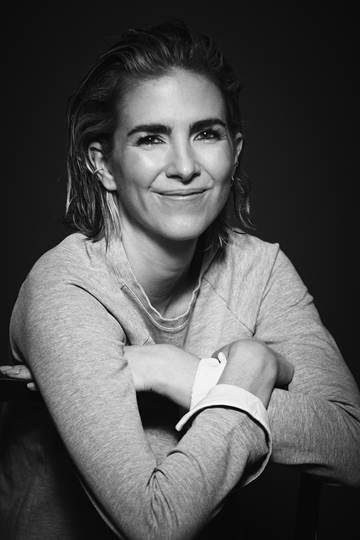Ana Maria Caballero
A Petit Mal (creative non-fiction)
Ana Maria Caballero was born in Miami in 1981 but spent most of her childhood in Bogotá, Colombia. She is seeking an MFA in Poetry at Florida International University, where she was runner-up for the Academy of American Poets Prize. In 2020, A Petit Mal, her first nonfiction manuscript, was shortlisted for the Tarpaulin Sky Book Awards and the Split/Lip Press cycle. Her collection Entre domingo y domingo (From Sunday to Sunday) won Colombia's 2014 José Manuel Arango National Poetry Prize. Finishing Line Press published Mid-life, her first chapbook, in 2016. Her writing can/will be found in journals such as The Southeast Review, Sundog Lit, Tupelo Quarterly, and CutBank and reached the final round of consideration in Ploughshares' 2019 Emerging Writers Contest, judged by Leslie Jamison. More online at anamariacaballero.com.
Ana's reaction:
"Winning the Beverly International Prize is unbelievably exciting. I am deeply honored and thrilled to work with the Black Spring Press Group to bring A Petit Mal into the world."
Thank you so much for all writers who entered this prize. The Beverly Prize is an incredibly valued staple within the offices of The Black Spring Press Group and it thrills us to have the same enthusiasm and exceptional efforts met by writers who enter. The judge for this prize, Lisa Pasold, has written a wonderful piece describing her journey through judging this prize, along with some words about the winning entry and other notable works from the entries:
'To begin, in naming a winner for the Beverly Prize, I have to say how struck I was by the sheer variety and daring of the manuscripts. I was asked to choose “the best” from a stunning list of very different works—from poetry to novels to essays to memoir to short stories. How to compare? How to choose?
I looked for manuscripts that stayed with me after an initial read-through. Voices that slyly demanded attention stylistically as well as thematically. I looked for stories which surprised me, but which also cried out for a larger public. Many congratulations are due to these shortlisted writers, because each one absolutely fulfills these criteria. Thank you for giving me such stimulating reading over these past months!
My winning choice is Ana Maria Caballero’s extraordinary work of creative non-fiction, A Petit Mal.
This is a precisely-calibrated work of non-fiction. Caballero writes about her quest to understand her son’s epilepsy. A Petit Mal is a difficult book, asking questions that do not have clear answers. The author weaves poetry, stark statement, and stream-of-consciousness into a narrative voice of rare empathy and honesty.
Whose story is this, Caballero asks, because she is telling her own story, but also, inevitably, her son’s. As a family, she and her husband seek alternative healing possibilities for their suffering child—a journey which takes them to a wide array of “witch doctors”, as she comes to call the team of doctors, healers, and even the convincingly helpful veterinarian. But of course, by writing the exact details of her days, by discussing her son’s various treatments, she also inevitably involves other people and their stories. How can one writer make sense of memory and experience at all? Is a literary form useful for such exploration? How can we remain honest, while interpreting the way other people choose to live?
We feel Caballero’s confusion, her desperation, when she writes, “What to believe, we ask. All of it: for now, believe all the doctors say. It must be coming, nearing, we say, the pierce of sharp lamplight.” Note the lack of question marks in that section. In fighting for answers, Caballero experiments with the very idea of questions. She adjusts punctuation, plays with space on the page, makes asides with witty footnotes, in a constant and successful challenge to smoothly straight-forward memoir. Nothing about her son’s journey was smooth, and as a creative work, Caballero clearly lays out the manuscript as one large query—about the medical establishment, about individual life, about healing and spirituality.
In focusing on her son’s story, Caballero brings in not only her own fears and interests, but also those of her family, her friends, and those of writers she admires. This extended literary family forms a skeletal support for the book. Caballero spirals repeatedly back to T.S. Eliot’s poem The Love Song of J.Alfred Prufrock. Circling the core story of her son’s struggle, Caballero weaves strands of these extended stories from personal to literary and back again—including the most heartbreaking death, the story of a friend whose baby dies of cancer.
Caballero is writing her way through the experience as a poet, creating a deep, spiritually complex, self-questioning work of non-fiction. She writes: “I will not miss / seizure of boy when / gone But I will miss / writing of book when / done” As I miss reading this book, now that I am done. It circles, dares, and intrigues the reader, and for these qualities A Petit Mal is the winning manuscript for the Beverly Prize.
“Eventually, I will make you happy. But it will be a process. A procedure, but not a medical clinical one, not even, entirely, a holistic one, because holistic can mean complete, and procedure here will not be complete.” – Ana Maria Caballero
OTHER NOTABLE WORKS:
Hoangmai Pham
Keeper of Stories: Finding the Buddhist Communist's Jewish Granddaughter (memoir)
Hoangmai Pham evocatively unpacks a hoard of stories as a first-generation Vietnamese American. But she also examines her own dissociative identity disorder—an intense and disturbing mental phenomenon. This work is an impressive balancing act, since few stories about coming to American admit to such devastating psychological scars. Mai Pham has the courage to speak.
‘“I often wonder at how much more connected you feel to your ancestors than to some of your living relatives,” Blue observed. Having chosen my role, I was searching for my model among the ghosts.’ – Hoangmai Phama
~
Sativa January
TRUE
(fiction)
The author’s experiences working for The Special Court for Sierra Leone, a UN criminal tribunal, make this novel particularly vivid. In TRUE, the privileged do-gooder narrator flails ineptly with her own ambitions, in a lushly-horrifying novel that evokes a people and place doomed by human ineptitude and cruelty.
“I ask the question that I’ve heard asked a million times, politely, between locals and internationals, not as a way to break him, but to open conversation, to puncture the façade. What did you do in the war?” – Sativa January
~
Kristen Forbes
Let Me Know if You Need Anything
(Essays on Childhood, Parenthood, Love & Loss)
This loosely-knit memoir delicately probes the selfish nature of grief. Forbes explores her own grief, and considers the bloody-minded uniqueness of loss and its impact on others. One section of the work is titled “So Your Dad is Dead and Your Toddler Wants to Disown You: A Guide”—which perfectly summarizes Forbes’ self-deprecating search for reasons in a world that has none to offer her.
“Tell me that story again. Tell it to me every day. I won’t interrupt. I won’t look at my phone. I have all the time in the world. Tell me that story again.” – Kristen Forbes
~
Emilie Murphy
Toasted Ice
(fiction)
Playing with the messy intimacy of families—necessary, awful, beloved—Emilie Murphy builds a realistic story of healing. Her family of flawed characters give this novel a propulsively-readable energy.
“There was an incident. There were so many incidents, they ran together, some became one blended moment, others fractured into tiny sharp pieces that hurt every time I thought back.” – Emile Murphy
~
Samantha Schoech
A Reason for Everything
(short fiction collection)
Here is the work of a writer with a finely-tuned eye for human absurdity. This collection is notable for Schoech’s sneakily magnificent epiphanies—these twelve stories never end where or how one expects.
“I couldn't pinpoint the moment when my mother turned into this type of irrepressibly positive middle-aged woman — the kind of woman who bought books of daily meditations and drank ginkgo biloba smoothies and made dinner dates with women who visited psychics and went on singles trips to Costa Rica.” – Samantha Schoech
~
Carol Major
The Asparagus Wars
(memoir)
Carol Major examines her artist daughter’s life and death in this memoir. The narrative collages flash-back, memory, and narrative present (which takes place in the lushly-described battlefields of the Marne, some time after her daughter’s death.) In taking on her own sometimes reckless choices, Major builds hope into a story of loss and mourning.
“People said how it was a shame, how beautiful you would have been without that disease, but you told me muscular dystrophy had shaped you; it was who you were and you liked who you were—something that extended the possibilities for being human.” – Carol Major
~
Ben Egerton
The Seed Drill
(poetry)
Ben Egerton crafts a devastatingly personal lyric of the contemporary in his poetry collection, The Seed Drill. From the first page, Egerton’s wide-ranging ruminations consider life, sterility, history, technology—and a 16th century ship—all filtered through precisely-weighted language.
“That so much has gone to spoil in those idle minutes, that one thing has led to another (a name, / a scene, a phrase, a passerby), that momentary opening of the private browser, that brief / and unsatisfactory relief, that everything that’s sown in the dark will be reaped in the light.” - Ben Egerton
~
Ea Anderson
I Want to be This Girl
(short fiction collection)
Can you leave your life and reinvent yourself? Ea Anderson examines this question in a tightly-controlled and elegantly-executed collection, beginning with the titular story, I Want to be This Girl.
“I think I would like to fall out of character. Not in any forced way, then it wouldn’t be falling. I want to just naturally burst. Lately, I have tried to help it along, to gently crack myself open.” – Ea Anderson
Thank you all again! The 2021 International Beverly Prize for Literature is now open. We wish you all good health and safety.

